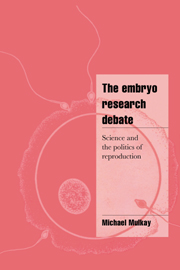Book contents
- Frontmatter
- Contents
- Preface and acknowledgements
- List of abbreviations
- Introduction
- 1 The background to the debate
- 2 The sequence of parliamentary debate
- 3 Political parties and ministerial tactics
- 4 The impact of the pro-research lobby
- 5 Embryos in the news
- 6 Women and men
- 7 Science and religion
- 8 The myth of Frankenstein
- 9 Embryo research and the slippery slope
- Epilogue: intruders in the fallopian tube or a dream of perfect human reproduction
- Notes
- Index
4 - The impact of the pro-research lobby
Published online by Cambridge University Press: 24 August 2009
- Frontmatter
- Contents
- Preface and acknowledgements
- List of abbreviations
- Introduction
- 1 The background to the debate
- 2 The sequence of parliamentary debate
- 3 Political parties and ministerial tactics
- 4 The impact of the pro-research lobby
- 5 Embryos in the news
- 6 Women and men
- 7 Science and religion
- 8 The myth of Frankenstein
- 9 Embryo research and the slippery slope
- Epilogue: intruders in the fallopian tube or a dream of perfect human reproduction
- Notes
- Index
Summary
In the early debates that followed the presentation of the Warnock Report, the anti-abortion lobby encouraged and prepared speakers in both Houses to condemn embryo research and to demand legislation that would bring such research to an end. This active lobbying had a particularly powerful effect upon the numerically superior and ideologically receptive Conservative Party. As a result, the long-standing repertoire of anti-abortion arguments concerning the rights of the unborn and the importance of maintaining the traditional family was adopted by a large number of parliamentarians and reapplied to the new topic of research on human IVF embryos. In this way, the parliamentary debate over embryo research began as a virtual replay of prior debates over abortion reform. This time, however, the anti-abortionists/anti-embryo researchers were well organized and politically ascendant, whilst those in favour of research were unorganized, poorly prepared and in a parliamentary minority.
The anti-abortion lobby, like the ALRA two decades earlier, tried to take advantage of its parliamentary dominance by introducing a Private Member's Bill. But, unlike the ALRA, the anti-abortion lobby was confronted in Parliament by an experienced band of tactically skilled opponents. In addition, again unlike the ALRA, it had to deal with an unsympathetic Government whose officials repeatedly deferred the final decision about the fate of embryo research. In the 1960s, the anti-abortionists had suffered from the speed at which the Bill on abortion passed through Parliament.
- Type
- Chapter
- Information
- The Embryo Research DebateScience and the Politics of Reproduction, pp. 57 - 68Publisher: Cambridge University PressPrint publication year: 1997



